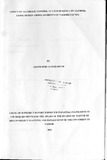| dc.description.abstract | The study set out to investigate the effect of Alcoholic Control Act 2010 of Kenya on alcohol consumption among residents of Nairobi County. The objectives of the study were to establish the extent to which the Alcoholic Control Act affects the volume of sales of alcoholic beverages in Nairobi County, to determine to what extent the Alcoholic Control Act influences the time for alcohol consumption of residents in Nairobi County, to establish the extent to which the Alcoholic Control Act has influenced underage alcohol consumption, to investigate the influence of Alcoholic Control Act on amount of alcohol consumed by residents of Nairobi County.
Alcohol abuse is a serious health burden, and it affects virtually all individuals on an international scale. Health problems associated with alcohol abuse arise in the form of acute and chronic conditions, and adverse social consequences. Every year, alcohol abuse leads to 2.5 million deaths of people, that includes 320 000 young people between the age of 15 and 29. It is the third leading preventable cause of death, accounting to 4% of all deaths globally. The study was conducted as a cross sectional descriptive survey. The target population was the residents of Nairobi County. The residents of Nairobi County were chosen as the population for this study. This was aimed at providing a wide range of opinions and experiences about the Alcoholic Control Act. Random Sampling was used in this study. The data was collected through questionnaires as the main technique.
Data was collected by the researcher over a period of three weeks by the use of self administered questionnaires which were given to the sampled participants. The questionnaires were edited, coded and data was entered by the use of a Statistical Program for Social Scientists. Data was summarized by using descriptive statistics and presented in form of percentages, proportions and frequency tables. Demographic factors, especially age, sex and marital status greatly influenced the decision of the respondents to consume alcohol. Most of the bar proprietors were against the Act since it affected their businesses. Majority of Nairobi residents consumed alcohol between 6-11 pm before the enactment of the Alcoholic Control Act and between 7-11 pm after the enactment of the act. Underage persons were restricted in most businesses in Nairobi. Majority of the respondents consumed alcohol to have fun. Not much has been done to educate Kenyans on the dangers of alcoholism, its prevention and management. | en_US |

